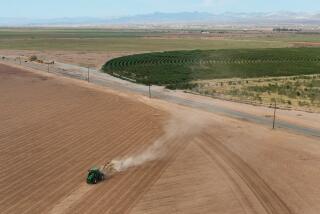El Niño strengthens. Hope for serious drought relief?

A pedestrian with an umbrella walks in Sacramento during a rainstorm in April. El Niño conditions are strengthening in the Pacific Ocean, forecasters said.
- Share via
El Niño conditions in the Pacific Ocean that were first identified in March are strengthening, federal scientists said Thursday, renewing hope that the next winter could be a long-awaited wet one for California.
The weather phenomenon intensified from “weak” in April to “weak-to-moderate” in May, the National Oceanic and Atmospheric Administration’s Climate Prediction Center said. Officials said there is now an 80% or greater chance that El Niño conditions will persist through the latter part of the year — up from more than 60% in April’s forecast.
A strong El Niño that lasts deep into the winter and into next spring would be favorable for California. Very strong El Niños are highly likely to bring substantial rainfall for a region besieged by years of drought.
Bill Patzert, climatologist for NASA’s Jet Propulsion Laboratory in La Cañada Flintridge, said this year’s El Niño looks promising.
“This looks like the real deal, and something that might replicate the famous 1997-98 El Niño. This is as close as we’ve come,” Patzert said. In fact, he said, while one heavily wet year won’t be a drought-buster -- because it would take years of rain to make up for what was lost -- “it would certainly provide what we would call genuine relief.”
“It could be the beginning of the end. Potentially the beginning of the end of the drought,” Patzert said. “If this continues through the summer and into the fall, and it has the same intensity that it did in 1997, it’s about as sure as you can get, it’s about as close as you can get to a sure thing.”
But it’s too soon to know whether El Niño will last through California’s late autumn and winter rainy season.
“There’s no 100% guarantee,” Patzert said.
If it peaks too early it could fade, doing the parched state little good, said Mike Halpert, deputy director for the Climate Prediction Center in Maryland.
“It’s not quite time to buy the ark yet if you’re out in California,” Halpert said.
El Niño is a weather phenomenon involving a warming of the Pacific Ocean at the equator, between the Americas and the International Date Line, which causes changes in atmospheric conditions that, during the winter, can bring wet storms to soak California.
“What matters is: During your rainy season, during the winter time of the year, is El Niño ongoing and is it strong enough to impact the jet stream across the Pacific Ocean?” he said. “Say this event develops and strengthens during the summer, but by next winter it’s on its way out? Well, then, that’s probably not going to help you out very much.”
Two of the most powerful El Niño weather conditions in recent years formed in 1982 and 1997, and the storms that drenched California in the winters that followed caused floods that made national television news.
Halpert said the current El Niño event boasts ocean surface temperatures that are actually warmer than they were at this point in the spring of 1997, which was followed by powerful rainfall the next winter.
But El Niño can be fickle. El Niños can last nine to 12 months, and in some cases go for as long as 15 to 18 months. But they can also fizzle out with disappointing speed.
About a year ago, forecasters saw promising signs that El Niño might begin, but those predictions dried up as California’s brutal drought marched into a fourth year.
The NOAA forecast was issued two days after the Bureau of Meteorology in Australia said their observations indicate El Niño is “likely to persist in the coming months.” Officials there said El Niño is expected to become the dominant influence on Australian climate during the latter half of the year.
But in places like Australia, El Niño can have the opposite effect that it can have in California, bringing drier and warmer conditions.
Even if El Niño turns out to be strong and brings much-needed heavy rains, experts have warned that one very wet winter will not be enough to get California out of its drought.
But it would be a start.
Follow me on Twitter for more California breaking news: @ronlin
More to Read
Sign up for Essential California
The most important California stories and recommendations in your inbox every morning.
You may occasionally receive promotional content from the Los Angeles Times.











